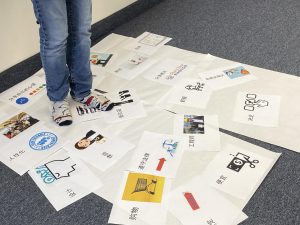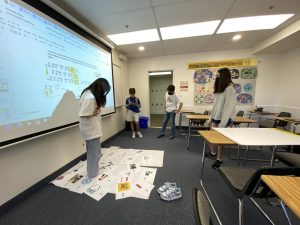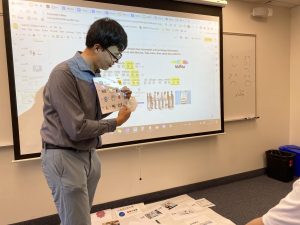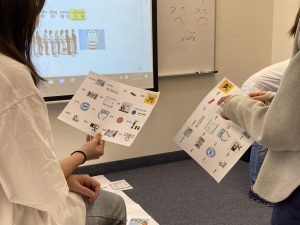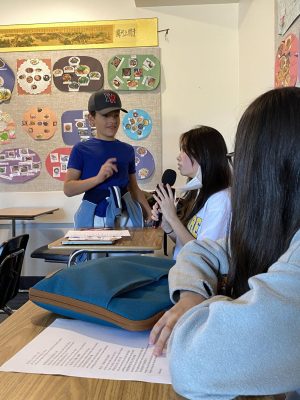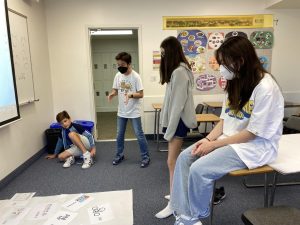Summer Programs: The Good, The Bad, The Origin
Wolverine Sports Camps, North Faring Exploration, Coldwater Prep classes introduce activities, education to both campuses in the heat of the season
July 12, 2022
By students in Intro to Print Journalism, edited by Amber Zhang ’25 (HW)
During the year, Harvard-Westlake (HW) students are scurrying to their lockers to get their necessities for their next class, and in the summer, there is a mix of HW students and students from other schools together doing different activities. Whether it’s running on the track, writing an article in print journalism, debating with friends, or even just to learn more about a subject, HW Summer programs give students the opportunity to experience something new.
“We are able to learn extracurricular subjects as well as develop new relationships with those who aren’t only in your grade, but those who are younger or older, including your teacher or coach,” Katelynn You ’26 (HW) said.
Patterson has worked to make the summer programs more engaging. His emphasis on fun is what led him to manage the summer programs with the mindset of distancing himself from a typical school atmosphere.
“We’re not a summer camp, by any stretch of the imagination,” he said, “But I want to be like a summer camp. I want kids to come here and enjoy being here, have fun, make some friends, learn some new things, in the same way that you do that at a summer camp.”
“That,” Patterson says, “does really allow us to create what I think is an environment that is really, really quite special.”
North Faring Exploration offers academic courses for grades 5-7 that provide a similar feeling to a summer camp.
Coldwater Prep classes are a bit more serious and are made for grades 7-12, but don’t carry the stressors that classes in during the school year may bring to the students as well as the teachers.
“You get to meet a lot of really interesting kids and develop relationships with them, all in a context where you’ve removed a lot of the stressors that you have during the academic year,” he said. “We’ve still removed a lot of those things that really stressed students out; we’ve also removed a lot of the things that honestly stressed teachers out.”
This was one of the challenges Patterson faces running the program. He says that teachers are less enthusiastic about working during the summer after finishing a long school year.
“Just as the school year ends, the summer program starts,” Patterson said.
He emphasized the importance of resilience, even if the summer administration is short of staff or facing any similar challenges.
He also said that the summer operations are “out of sync” with the rest of the school year, making it difficult to balance the regular operations of the school with the activities going on during the summer.
Regardless of the challenges that come with running such an extensive summer program, Patterson believes in giving participants a fun experience.
One of Patterson’s goals is to identify the uniqueness of HW and offer them as opportunities for summer enrichment programs that are available for students from different schools, giving kids the chance to meet people with different backgrounds and passions.
For example, Wolverine sports camps allow students in grades 3-12, from any school to experience HW athletics, coaches and facilities.
“I have tried to look across the rest of the school to see what are the other elements we offer during the academic year that might be able to have a summer equivalent that can be offered to the wider community,” Patterson said.
Inclusivity is an important part of the summer program for Patterson, an aspect he takes special care to ensure is prevalent in the community. Currently, more than 450 schools are represented in the summer program, and roughly 40% of participants do not currently attend Harvard-Westlake.
“As I walk around at lunch or at any other time, I’m hard pressed to tell you ’Oh, that’s the Harvard Westlake, that’s the Crossroads,” Patterson said. “I just can’t do that and nor do I want to do that.”
Patterson has served the Harvard-Westlake for 28 years of his career. He worked as a science and math teacher before becoming a dean, and now is the Director of the Kutler Center and Summer programs. Patterson has been the director of the summer program for 16 years since 2006. When he got the position, Harvard-Westlake was looking to expand and improve their summer programs.
Patterson said it was, “a great time for us to reimagine what we might do with our summer operation and create something that you see today.”
He said his goal is to create a special experience for both the educators and students.
“I hope people join HW Summer Programs to get a taste of Harvard-Westlake.”
North Faring Exploration makes learning fun for kids
String Duets and Trios
By Lyla Kavanagh ’26 (HW)
String Duets and Trios is a North Faring Exploration program run by music teacher Emily Reola.
Reola has a rising tenth grader and rising junior also assisting in the program.
It was started by. Reola when the performing arts program first began on the lower campus.
“For some of them, it’s their first time playing chamber music or a part by themselves,” Reola said.… “I want them to gain confidence in their playing.”
She said she wants students of all ability levels to have a positive first experience playing chamber music.
Around the World in 13 Days
By Tali Gurule ’27 (HW)
Through cooking, languages, history, fashion and music, students spend three weeks learning about different cultures in Spanish teacher Aaron Bluestein’s “Around the World in 13 Days” class at the middle school.
“There’s such a diverse and amazing world out there and giving kids exposure to those other cultures and languages, hopefully, will help them develop skills of compassion and tolerance and an interest in difference and people with different mindsets,” said Bluestein.
Over six years ago, Bluestein used his love of languages to create a class focused on the various aspects of cultures around the world.
Boil Fizz Pop
By Mia Ushiba ’26 (HW)
The Boil Fizz Pop science class incorporates hands-on experiments and cooking to make a fun and engaging science program for students grads 5-7.
Here, young researchers discover and learn more about the changes food goes through in the kitchen. They participate in journal reflections, cooking and experimenting, and of course, trying the food afterward.
“They are so curious,” science teacher Jordan Bricker said. “They always want to know more. They always want to learn the reason behind it.”
Bricker has been a 6 and 7th-grade science teacher for about five years and believes that hands-on experiments are important for students’ learning experience.
She believes it is essential to keep asking questions in the lab and try it out for yourself, taking compelling risks for an exciting and interesting outcome and discovery.
Lemonade Stand
By William Tang ’26 (Science Academy STEM Magnet) & Angela Ren ’26 (HW)
Lemonade Stand is a three-week course taught by Communications Department Head Jen Bladen at North Faring Exploration, an enrichment program for students going into grades 5 through 7.
“My biggest hope for the students of Lemonade Stand is that they go out into the world and think as problem solvers, rather than just identifying a problem and not thinking there’s anything they can do about it,” Bladen said. “I want them to be empowered, to go out and solve what they see.”
The students of the class spend three-weeks developing their business ideas, watching different entrepreneurial videos and participating in upcycling. But some students arrive to class with goals, ideas and solutions ready to be implemented.
“My goal was to invent something and try to take away a lot of knowledge and I think I did take away a lot of knowledge and how to solve a problem and how to think of a problem,” Serena Hayoun ’29 (Emerson Middle School) said.
She is innovating a way to keep store-bought flowers alive for a time span of six months to a year.
“I’m using a glycerin to water ratio of 2 to 1 in a mixture to keep store-bought flowers alive for a longer time because for me personally, they die after about a week of purchase. And so this mixture, the flowers soak up the mixture and it replaces the moisture in the flowers,” Hayoun said.
Ari Jain ’30 and Hayden Milken ’30 really enjoy the Fridays because they get to bring in trash which they then try to find a use for in their projects.
Every Friday, while they upcycle, the students of Lemonade Stand watch Shark Tank, an American business reality television series on ABC where entrepreneurs present their businesses to five millionaire investors to invest in.
In the summer of 2021, Bladen was invited to teach the class. She loved the idea of so much time for brainstorming and thinking outside the box and trying to solve a problem.
Each entrepreneur in training will come up with a problem that they want to solve, and then they’ll brainstorm solutions. The next step is to ideate prototypes. Each student sketches their ideas and decides how exactly they want their prototype to look. The challenge is that they have to actually create a tangible model with limited resources.
Bladen noticed that the things her students enjoyed the most were also the hardest. She said it is always so satisfying for the students to finally prototype something really difficult, such as a student who tried to create jewelry out of trash on the beach and when she finally did it, she was thrilled.
“I took this class because I thought it was actually about lemonade,” Zhang said.
“If the problem you want to solve is access to lemonade, we can solve that problem together,” Bladen said.
Music Theater Workshop
By Joanna Xia ’27 (HW)
Think about it, there has to be a time when you acted out something or watched something that dealt with dialogue, singing, and dancing. Well that folks, is a perfect example of the type of experience you will have if you join the Music Theater Workshop at North Faring Exploration. To train aspiring actresses and actors, students are able to do fun activities, training for both singing and dancing, and then performing the end result at the end of the program. The workshop shows that there is more to being an actor than just reading a script or memorizing lines for a dramatic scene or musical. Music Theater is a great way to take your passions and push yourself beyond limits that you would never think you could reach. In this class, students get to explore and find their creative side through the fun of interactive theater games, activities for voice training in groups, and shaking things up with dancing.
Coldwater Prep gets scholars ready for school year
Finance Fun-Oh-Fun
By Lyla Kavanagh ’26 (HW)
Finance Fun-Oh-Fun is a summer program that’s been running for several years, and is based on an open lesson plan that encourages students to ask their own questions surrounding finance in a fun environment.
“One dose finance and two doses of fun,” said Patrick Toche, this year’s teacher.
He hopes for his students to gain an understanding of how to access data on our current economy using the internet, get a sense of how broad of a field economics is, and experience a class similar to what a college level finance class might look like.
English Essentials 1
By Caroline Cosgrove ’26 (HW)
English Essentials 1, taught by English teacher Eric Olson, is a three-week summer program to improve writing, reading and overall English skills. Olson said the students who join his summer program have a variety of skill-levels. Some are interested in improving their abilities, and some are looking for more challenges.
“I have some students who really need a little more help with their writing basics. And I have other students who have mastered those and they’re ready for more and so trying to find ways to keep that engaging for both students is one of the bigger challenges,” Olson said.
Olson explained that in the program, the students learn to improve their writing skills, grammar, and most importantly, active reading.
His biggest piece of advice is to learn the difference between reading for pleasure and reading for class.
“When you’re reading for English, treat it a little differently. Treat it like homework, you’ve got to study the work, not just not just read it passively.” Olson said.
Futuristic China
By Angela Ren ’27 HW
In this fast-paced Chinese language course, teacher Bin He (何) introduces students to the most recent technologies in China.
He leads his students through activities, making sure everyone has had a chance to speak and taking the initiative to make sure that all the students understand the new information.
“The class was good, immersive, funny and enjoyable,” Finn Kapsos ’28 (HW) said.
He creates innovative lesson plans to make learning Chinese fun and interactive.
“学中文应该是一个很高兴的事 [Learning Chinese should be a very happy activity],” He said with a smile on his face.
Study Skills
By Tali Gurule ’27 (HW)
While middle and high schoolers spend an extreme amount of time studying each year, very few have actually learned how to study properly.
For three weeks, History/Social Studies teacher Joseph Makhluf teaches Study Skills class at the upper school.
“I just wanted to teach this class so that students have an easier transition to whichever school they may be attending in the fall,” he said.
Through researching, note-taking, organizing and planning, Makhluf teaches his 20 students the fundamental skills needed to be successful in school.
Writing the Research Paper
By Angela Ren ’26 (HW)
In a quiet, sunny classroom, Katelynn You ’26 (HW) scrolls through multiple sources about the death penalty while racking her brain on which side she should take in her paper.
Meanwhile, the Writing the Research Paper teacher Eric Fodor moves around the classroom giving feedback and conversing with the students about what they could improve on and what he likes about their progress on their research paper.
While Writing the Research Paper may not seem like a class many students would take, the six that do say they believe it’s a great way to improve their analytical writing skills and prepare themselves for similar assignments in high school.
Sky Lee ’26 (HW) said he decided to write about the theoretical possibilities of what would have happened if Adolf Hitler had been able to develop a nuclear bomb first.
Linden Azad ’26 (HW) chose to write about the murder of Emmett Till.
“I thought it was interesting because the story is extremely controversial,” Azad said.
Each fascinated by their own topics, the researchers work silently in the company of each other to draft their paper before the end of their two-week class.
Game Design
By Mia Ushiba ’26 (HW)
When you enter programming teacher Henry Woody’s Game Design class, you see approximately 20 students discussing and programming games.
Students use Unity editor to create 2d and 3d games, varying in dimension, innovation and skill levels.
Although it is an educational class, Woody said it’s essential, “to have fun producing a game” and it’s important to “Be interested in and have a passion for creating things,”.
Many of his students reflect these traits, developing platformer, topdown, and maze games, even designing an NFT gallery.
Woody said he loves the creative process and energy the students bring to class. He loves hearing the diversity of ideas they discuss and eventually proceeding through the design process, making their own unique and engaging video game.
Public Speaking
By Joanna Xia ’27 (HW)
Public speaking can be a nerve-racking experience, but it’s not impossible to master.
“Go ahead and join and just have fun,” teacher Andrew Yllescas said. “Speech writing is something that I think people see as intimidating, but basically write about whatever you want, we don’t really have prompts, could say write about a specific thing. It’s more like, hey, write about whatever you want, as long as it is informative writing, as long as it is about you, as long as it is creative, you can do whatever you want. It’s really a creative class.” So for the summer, find out what you’re made of by taking a class that will help you become an articulate and confident speaker.
Creative Writing
By Eze Baum ’26 (HW)
Creative Writing is an emphasizing process that encourages students to develop different styles and techniques. Taught by Lucas Gonzalez, students learn about different styles of writing and applications for them.
“Personally, the environment is really fun, it’s light, the teacher creates a good environment for us. What it’s like I think is a really fun class,” Gian Ngo-Willis HW ’26 said.
Summer Jazz Workshop
By Joanna Xia ’27 (HW) & Amayrani Ordonez ’27 (Stella Middle Charter Academy)
“This class is a really general overview of all things that go into playing and performing jazz,” jazz teacher Chris Sullivan said. “We do a lot of listening, a lot of discussion of what we are listening to, an analysis, we cover music theory, ear training, we study rhythm, different styles, like Latin, swing, funk, all across the board, we learn a lot of repertoire.”
“I encourage anybody reading this, if you go to Harvard-Westlake, to take the jazz class. Take a music class. There is nothing to be lost, and hopefully realize that it is a really fun thing that is welcome and open to anybody.”
Summer Film: The Basics
By Joanna Xia ’27 (HW) & Amayrani
Ordonez ’27 (Stella Middle Charter Academy)
Summer Programs challenge students to think in big ways that express themselves.
“In the summer, it’s really fun,” summer film intensive teacher Sarah Morton said. “I think that because it is not like a regular academic year, they are not getting grades, we try to keep it a little bit more fun and more light. But the way that I’ve always tried to do the summer film anyway, is that we are actually making movies. From the moment they start the class, they basically start filming their first day, and then start editing, so by the end, they know how to make a short film, on their own, that’s the goal.”






